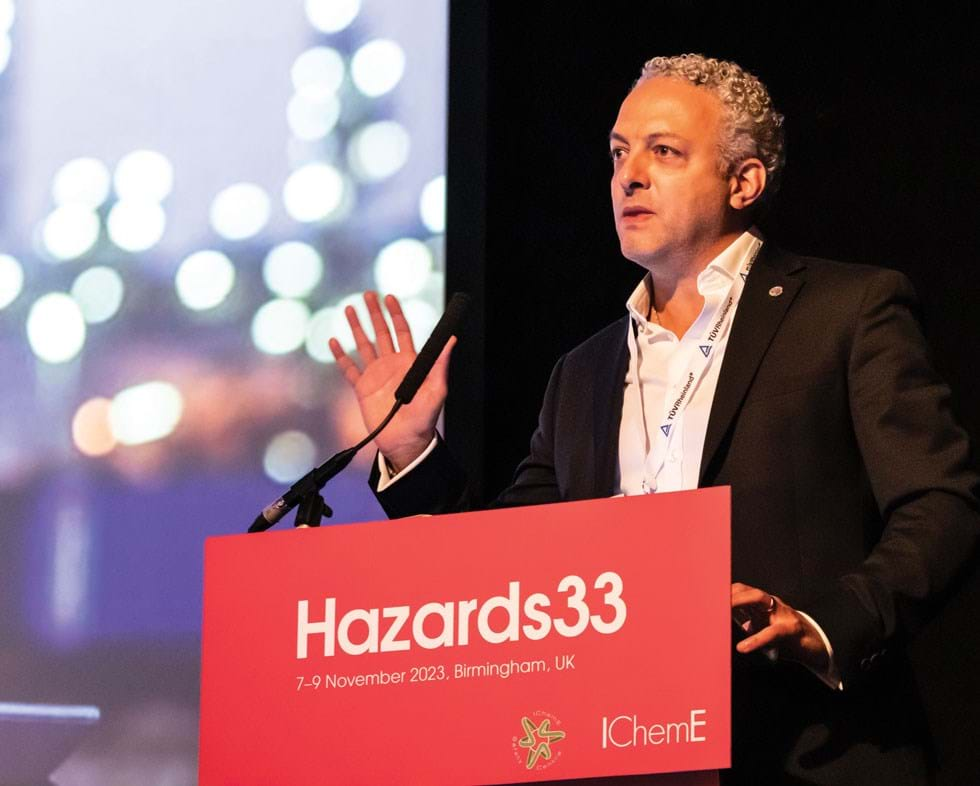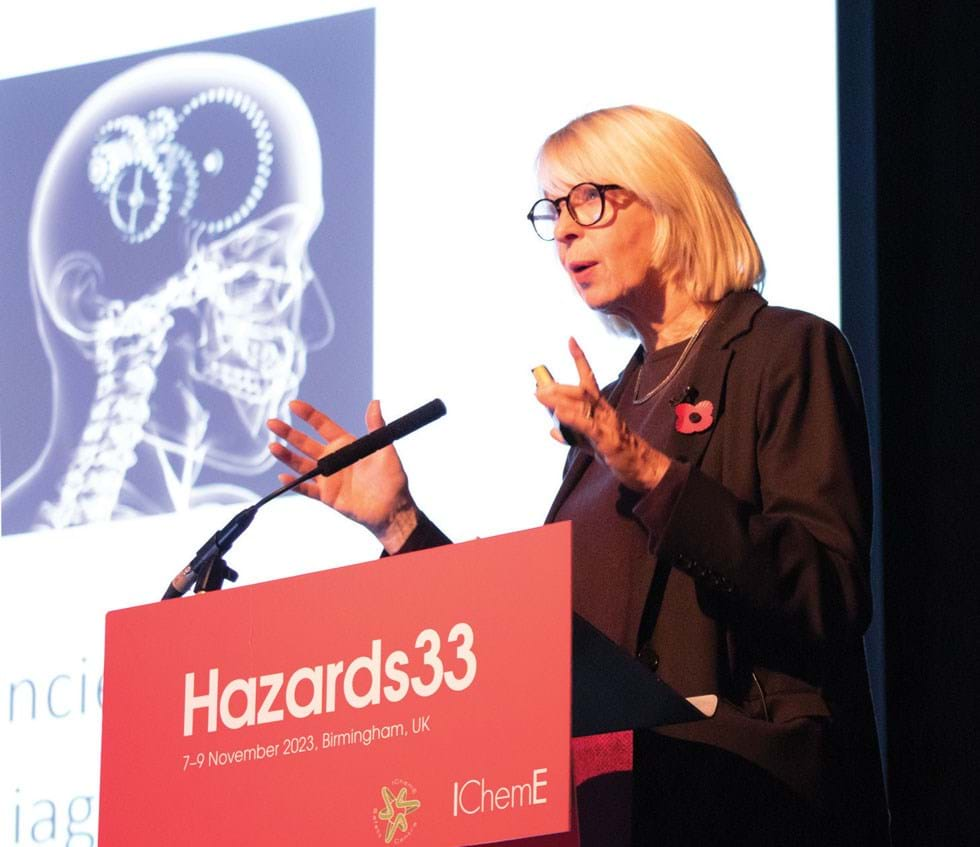Hazards conference: energies and skills impacts come into sharp focus
Safety professionals urged to consider transition, natech, and non-technical skills
“SURELY [during] the energy transition, as we transform our portfolio in Shell, we will become safer, right?” Cue a long pause. Then the response: “No, probably not.”
This from Amir Gerges, vice-president of group safety at Shell, whose Trevor Kletz lecture at IChemE’s Hazards conference in November set the tone for wider discussions about how technology scale up, non-technical skills, and climate change present significant challenges for process safety experts.
The question had been posed by a non-technical member of Shell’s board who assumed that building fewer industrial complexes and focusing on renewables and clean energy technologies would make the company and its employees inherently safer. “I don’t think so,” Gerges said.
He shared a word cloud showing the hazards associated with new energies and how they look in comparison to the ones Shell is used to managing with oil and gas.
“Our ability, however, to ensure it is safe is extremely challenged because of, in some cases, the lack of regulations. Some of it is lack of standards.”
Using hydrogen as an example, Gerges said that Shell is comfortable producing and using it safely at its industrial complexes but “we don’t know how to do it right and safe at a [fuel] retail site”.
Shell has opened 15 retail sites selling hydrogen for vehicles since 2021 but has closed six because of process safety risks. “There were no standards and procedures to tell us how far the pump should be from the retail shop or from a human being refuelling their car with regular petrol.”
On how Shell is looking to improve safety, Gerges said he is establishing an indicator focused on the potential for an event to cause harm rather than quantifying how big a release of chemicals was, as seen with industry’s use of Tier 1 and 2 process safety event classifications.
“I would like to have that argument around subjectivity: could that release, even if it was 10 kg, have led to a significant incident? A lot of our worst hazards happen within the first few seconds of a release. Not after it reached Tier 1,” he said.
He referred throughout his talk to the benefits and need for standardisation, including how he’d like Shell and its peers to use standardised checklists with contractors, so they don’t have to be retrained for each organisation they work with.

Scale-up and natech
The conference included sessions focused on hazards arising from new energies, including hydrogen, batteries, and renewables.
Faisal Khan, director of the US’ Mary Kay O’Connor Process Safety Center, is concerned that research into safety risks is not keeping pace with the rapid development and rollout of new technologies.
“My greatest challenge is that perhaps we are going too fast into an area without knowing where the pitfalls are.”
Khan outlined some key concerns related to hydrogen’s embrittlement of steel and the thermal safety of batteries. He called for safety experts across industry and academia to come together to better understand how the associated risks of new technologies change as they scale out from the lab towards wide-scale implementation.
The topic of natech hazards – natural hazards triggering technological disasters – received a lot of interest, with consultants sharing tips on how engineers can assess the vulnerability of their industrial facilities to the impacts of climate change.
Among them was Aimee Russell from RAS who urged attendees to think about how primary hazards could trigger secondary issues. For example, a thunderstorm leads to flash flooding, which erodes soil, which diminishes natural defences further, increasing flood risk. Or perhaps the flooding cuts off a key road preventing emergency services or staff gaining access to the site to help control the ensuing incident.
“A key aspect to consider in all of this is the human aspect. Natural disasters are traumatic events with increased links to PTSD, anxiety, substance abuse, and depression,” Russell said, noting that in the heat of an incident, personnel may not perform as expected or may be injured themselves.
“If you’re relying on them for making the site safe in an emergency, careful considerations are needed. Ensure that plans are available and provide clear instructions and decision-making tools.
“You [also] need to have a plan in place to identify who should make those decisions if the other person is unavailable.”
Mike McKay from TUV Rheinland and George Watson from University of Manchester then talked delegates through their analysis of how hazard studies can be adapted to cover climate change.
“It feels as though the Hazard 2 [HAZID study] can fairly readily be adapted by just tweaking some of the guidewords and adding some other prompts for consideration,” McKay said.
“We have a guideword of external fire, and I’m as guilty as everyone, when I think of fire, I think of hydrocarbon fire…I don’t think of wildfires. But maybe I ought to.”
For a HAZOP study they recommend adding a new guideword of “extreme weather”. With retrospective studies, such as Delta HAZOPs, they suggested asking operators how the plant functions in high winds or temperatures. “Get their feedback. What tasks don’t they like doing when it’s wet and cold. It all paints a picture of how vulnerable your plant is to climate change.”

Non-technical skills
The conference opened with a challenging presentation on human factors and behavioural safety from Rhona Flin, professor of industrial psychology at UK’s Robert Gordon University, who questioned whether engineers have a disregard or lack of awareness for non-technical skills. These include communication, decision-making and leadership.
Flin said: “This is an area I think is particularly relevant in process safety but an area that hasn’t really been exploited to its full potential.”
She noted there have been only a few studies related to the process industries (primarily in Italy and Norway) and warned that more is needed to fill the gap and understand what non-technical skills are required for roles within our industries, and that senior people in the community need to champion the effort.
Other professions, including pilots, have their non-technical skills checked for their license alongside their technical skills.
“It could be a gap [for process engineers],” Flin said.
This appeared to be backed up by an IChemE member survey on process safety competencies carried out by volunteer Helen Conlin. She shared the interim results with delegates, showing that non-technical skills were ranked lowest in importance to the question: “What are the key process safety competencies for a chemical engineer?”
“For pretty much all the engineering professions right now, non-technical skills is a very under-developed area,” said Conlin.
“There’s a great benefit and opportunity to do more around non-technical skills throughout all the career phases to get the most out of our technical skills and knowledge.”
The full results are set to be published early in 2024.
Leadership was a common thread throughout the conference. Conlin noted that leadership isn’t just what comes from the top and that “leadership is what is required in any given situation by an individual or a role. We all need to provide leadership”.Ashley Hynds from DNV focused on the
positive impacts that senior leaders can have on process safety. He has developed a site visit toolkit that includes eight activities for process safety leaders to undertake with staff. This includes a small group discussion and a control room visit, and each includes a breakdown of the activity, how it should be carried out, and what follow-ups leaders should make.
“Leadership visits can be a really important tool as part of a wider approach to engage the workforce in process safety and an opportunity to positively influence the culture over the longer-term,” Hynds said.
The PowerPoint presentations from the event are available at: https://bit.ly/3T1efHa
Recent Editions
Catch up on the latest news, views and jobs from The Chemical Engineer. Below are the four latest issues. View a wider selection of the archive from within the Magazine section of this site.




